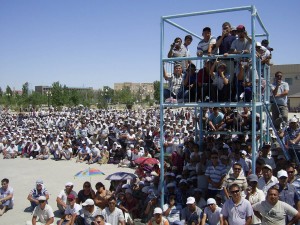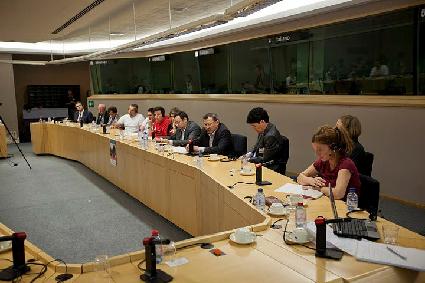Ukteshbayev and Kurmanov have long tried to establish an independent trade unions in Kazakhstan. They described the difficult situation for workers in the oil fields in Kazakhstan, emphasizing in particular the strike followed by clashes in Zhanaozen. Limited access to information makes it still unclear exactly what happened in Zhanaozen, but they fear the numbers of wounded and dead may be higher than the official figures, and that the official investigation is aimed at finding guilty rather than the truth.
Norwegian Helsinki committee supports independent investigation
NHC is of the opinion that an independent international investigation into the Zhanaozen events on last December must be carried out. – It is of paramount importance that investigations into the clashes and the resulting deaths are conducted in an independent and transparent way, Bjørn Engesland, Secretary General of NHC said at the time. – Efforts to find peaceful solutions to this conflict should be initiated, and these efforts should be guided by fundamental human rights principles such as freedom of association and speech.
Background: Unrest in Zhanaozen
 Hundreds of workers from oil fields of western Kazakhstan have been on strike demanding better pay and working conditions since May 2011. NHC visited Aktau and Zhanozen in September 2011, learning about the situation. The Kazakh oil companies claim that the oil workers have higher average salaries than other sectors of Kazakhstan business; while the oil workers point to high costs of living and tough conditions of work in the oil sector. Zhanaozen is an isolated city in a desert-like surrounding, and everything must be brought in, making living costs much higher than in the rest of the country. The strikes and protests by the oil workers have not been met by dialogue efforts by their employers and Kazakh authorities.
Hundreds of workers from oil fields of western Kazakhstan have been on strike demanding better pay and working conditions since May 2011. NHC visited Aktau and Zhanozen in September 2011, learning about the situation. The Kazakh oil companies claim that the oil workers have higher average salaries than other sectors of Kazakhstan business; while the oil workers point to high costs of living and tough conditions of work in the oil sector. Zhanaozen is an isolated city in a desert-like surrounding, and everything must be brought in, making living costs much higher than in the rest of the country. The strikes and protests by the oil workers have not been met by dialogue efforts by their employers and Kazakh authorities.
 About thousand oil workers have been fired and replaced by others. At the same time, the strikes have proven to be costly not only for the striking oil workers but also for the oil companies that have lost millions due to reduced production. In a dramatic development, Natalia Sokolova, a union lawyer, has been given a six years sentence for “inciting social discord”. Another union representative, Akzhanat Aminov, has been given a two-year suspended sentence for organizing so-called illegal gatherings. On this background, social unrest and strikes may not be seen as a result of an ideological or religiously driven radicalization, but rather as a reaction to poor distribution of the wealth created by Kazakhstan’s expanding petroleum industry. Instead of accepting that striking oil workers lose their work, authorities could initiate serious dialogue on how to improve their situation and on the overall question of improving living conditions for ordinary Kazakhstanis.
About thousand oil workers have been fired and replaced by others. At the same time, the strikes have proven to be costly not only for the striking oil workers but also for the oil companies that have lost millions due to reduced production. In a dramatic development, Natalia Sokolova, a union lawyer, has been given a six years sentence for “inciting social discord”. Another union representative, Akzhanat Aminov, has been given a two-year suspended sentence for organizing so-called illegal gatherings. On this background, social unrest and strikes may not be seen as a result of an ideological or religiously driven radicalization, but rather as a reaction to poor distribution of the wealth created by Kazakhstan’s expanding petroleum industry. Instead of accepting that striking oil workers lose their work, authorities could initiate serious dialogue on how to improve their situation and on the overall question of improving living conditions for ordinary Kazakhstanis.
NHC continues to monitor the situation in Zhanaozen
 The activists from Kazakhstan warned against the large number of international companies that make money from Kazakhstani resources without investing much to the benefit of the people. –The strict regulations put forward by the Kazakhstani authorities in order for international companies to secure contracts do not benefit the population at all, concluded Ukteshbayev, – instead, the investments go straight to the pockets of the President and his closest circle.The Norwegian Helsinki Committee has followed the situation for the strikers in Zhanaozen since May, and is concerned with the ramifications this conflict has. – The difficult working conditions for trade unions and organized workers is alarming in that they violate the freedom to organize, assemble and express yourself as well as the right to strike, underlined deputy secretary general Gunnar Ekeløve-Slydal who moderated the event. For a state which is proud of its economic development this should not be allowed to pass.
The activists from Kazakhstan warned against the large number of international companies that make money from Kazakhstani resources without investing much to the benefit of the people. –The strict regulations put forward by the Kazakhstani authorities in order for international companies to secure contracts do not benefit the population at all, concluded Ukteshbayev, – instead, the investments go straight to the pockets of the President and his closest circle.The Norwegian Helsinki Committee has followed the situation for the strikers in Zhanaozen since May, and is concerned with the ramifications this conflict has. – The difficult working conditions for trade unions and organized workers is alarming in that they violate the freedom to organize, assemble and express yourself as well as the right to strike, underlined deputy secretary general Gunnar Ekeløve-Slydal who moderated the event. For a state which is proud of its economic development this should not be allowed to pass.
In conclusion, Ukteshbayev and Kurmanov warned that socio-economic reforms are necessary in order to counter more such protest in the future. – The authorities wanted to scare people off by shooting at the strikers and harassing them, but a growing discontent is already there, they said.
EU Parliament expressed its concern
 In December 2011, Paul Murphy MEP -Socialist Party in Ireland, organised a hearing in the European Parliament on the issue of workers’ rights and the ongoing dispute of the oil workers in the West of Kazakhstan. Amongst the speakers were leaders of the workers’ movement like Ainur Kurmanov and Esenbek Ukteshbayev. The hearing was an opportunity for the workers and activists to make their voice heard and to make contacts for solidarity campaigns. The hearing was opened by Paul Murphy who explained that Kazakhstan is potentially a very rich country with a huge amount of natural resources. But at the same time a majority of the population only knows poverty and misery. All resources, all wealth and all power are concentrated in the hands of a tiny elite that doesn’t hesitate to defend its privileged position with any means possible, including violent repression. That is also why the ongoing oil workers’ strike in the Mangistau region is of crucial importance. Despite the repression and the pressure on the workers, they continue their strike. Their determination turns the strike into a point of reference of resistance against oppression and exploitation.
In December 2011, Paul Murphy MEP -Socialist Party in Ireland, organised a hearing in the European Parliament on the issue of workers’ rights and the ongoing dispute of the oil workers in the West of Kazakhstan. Amongst the speakers were leaders of the workers’ movement like Ainur Kurmanov and Esenbek Ukteshbayev. The hearing was an opportunity for the workers and activists to make their voice heard and to make contacts for solidarity campaigns. The hearing was opened by Paul Murphy who explained that Kazakhstan is potentially a very rich country with a huge amount of natural resources. But at the same time a majority of the population only knows poverty and misery. All resources, all wealth and all power are concentrated in the hands of a tiny elite that doesn’t hesitate to defend its privileged position with any means possible, including violent repression. That is also why the ongoing oil workers’ strike in the Mangistau region is of crucial importance. Despite the repression and the pressure on the workers, they continue their strike. Their determination turns the strike into a point of reference of resistance against oppression and exploitation.
 Mukhtar, an oil workers’ union leader, described the background of the conflict. He explained that this conflict has become of great importance as a turning point in the period since the collapse of the Soviet Union and as an expression of trade union solidarity. The strike started around demands on wages and working conditions. Management refused to negotiate and instead used brutal government repression against the strikers. As a consequence of the strike, 2,500 workers were sacked. They are only defended by the independent unions and the international support for which the visit of Paul Murphy had been essential. After more than four months the workers are demanding direct negotiations and the reinstatement of the 2,500 sacked workers.
Mukhtar, an oil workers’ union leader, described the background of the conflict. He explained that this conflict has become of great importance as a turning point in the period since the collapse of the Soviet Union and as an expression of trade union solidarity. The strike started around demands on wages and working conditions. Management refused to negotiate and instead used brutal government repression against the strikers. As a consequence of the strike, 2,500 workers were sacked. They are only defended by the independent unions and the international support for which the visit of Paul Murphy had been essential. After more than four months the workers are demanding direct negotiations and the reinstatement of the 2,500 sacked workers.
EU Parliament also sent a letter of appeal to President Nazarbayev calling to end violence, full text can be found here.
Related Stories
Norwegian Helsinki Committee: conflict in Kazakhstan should be resolved peacfully
Kazakhstan: Two decades of independence have no benefited free speach





